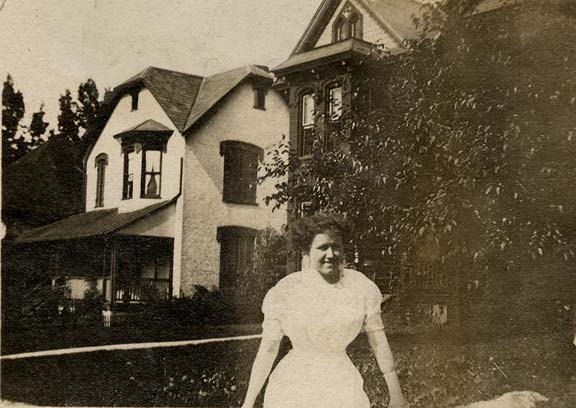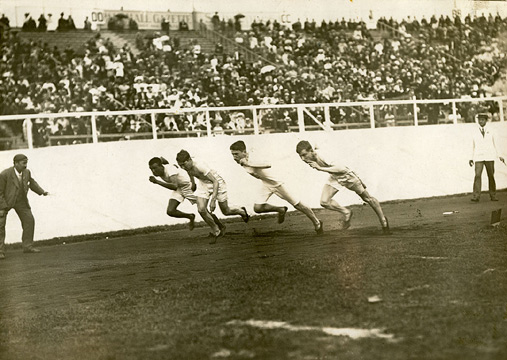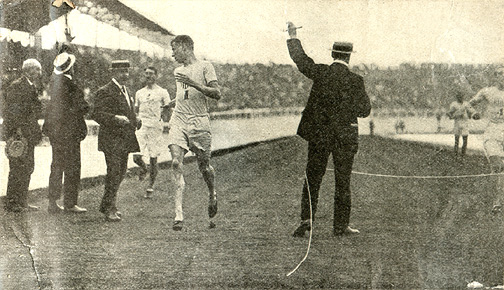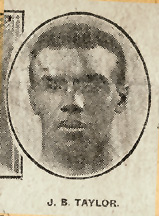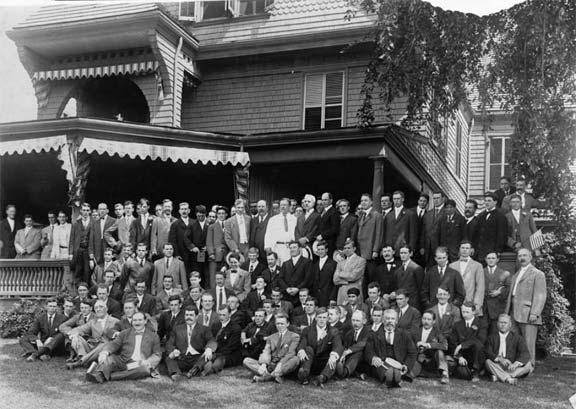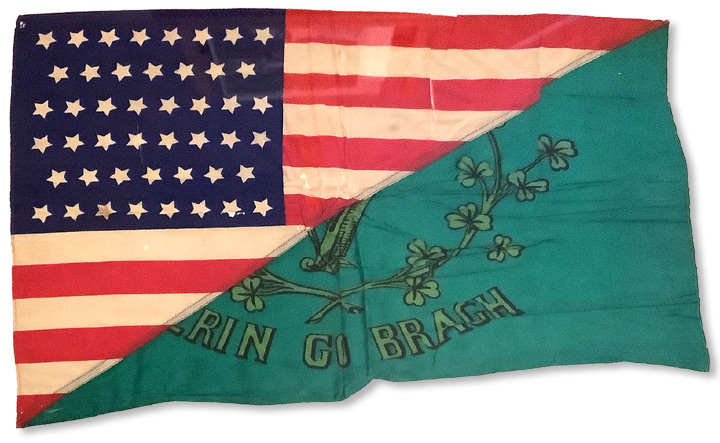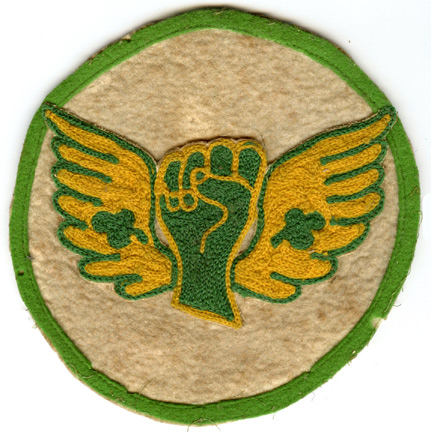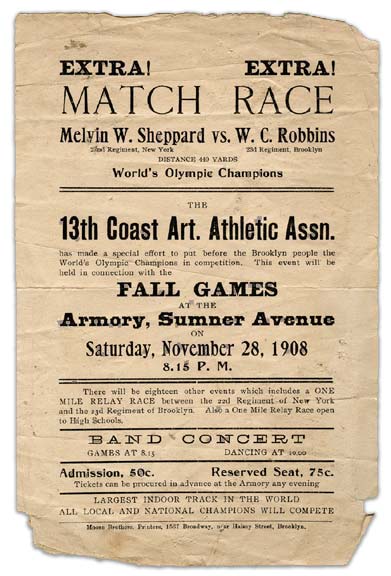|
|
|
|
|
|
|
|
|
|
|
|
|
|
|
|
|
|
|
|
|
William "Yank" Robbins' Scrapbook

William Corbett "Yank" Robbins
Born: August 9, 1885 in Cambridge, Massachusetts
Died: July 30, 1962
The following text and many of the images were derived from items in William Robbins' personal scrapbook.
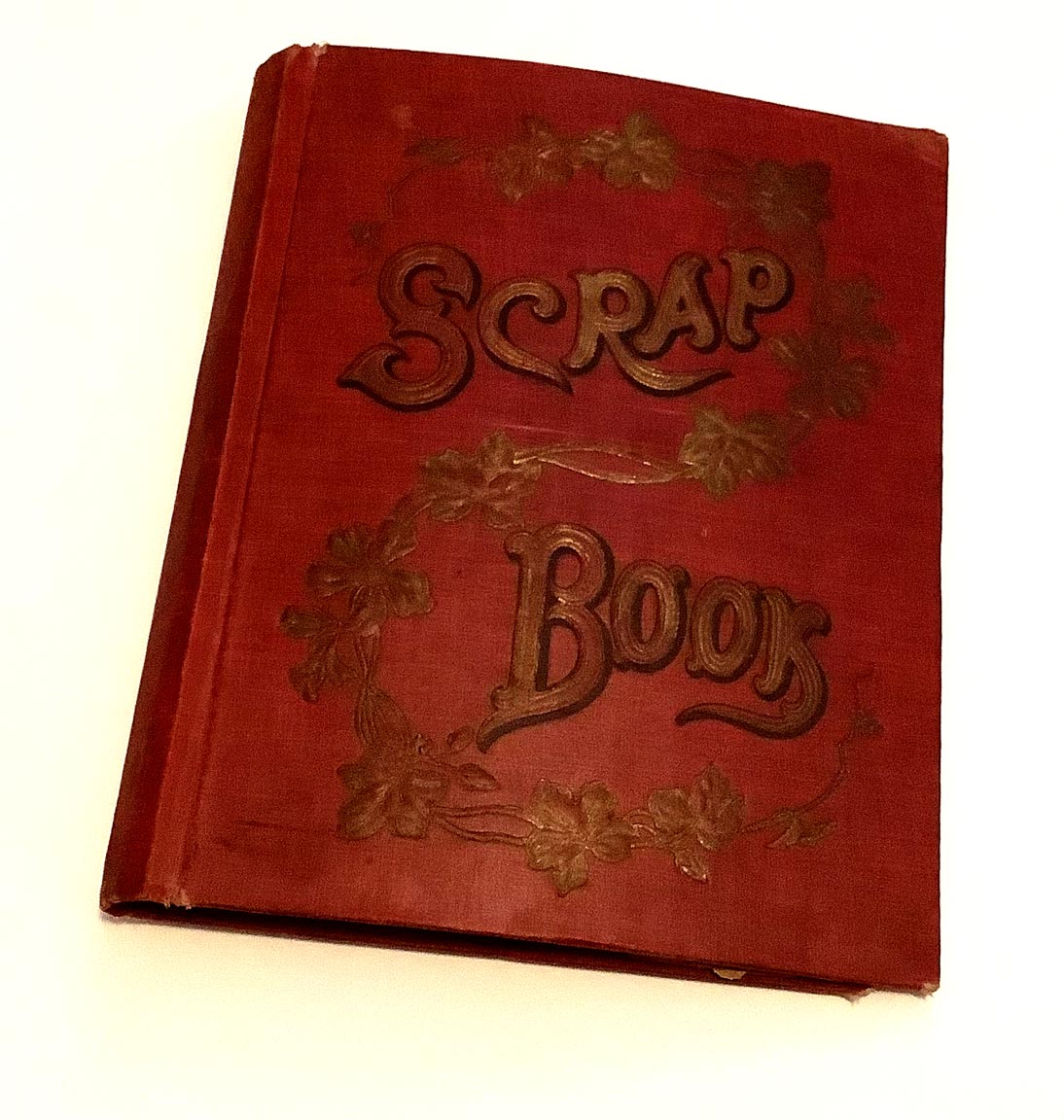 |
On this page: The 1908 Olympic 400 Meter Final - No Race! Robbins Describes his View of the Race |
|
Robbins was born in Cambridge, Massachusetts, living at 15 Pleasant Street with his mother. He attended Webster Grammar School and English High and Rindge Manual Training School. Later he went to Williston Academy and then Mercersberg Academy, where he broke the school record for the 440 yd dash, running 50 3/5 seconds. He ran for the Cambridge YMCA from age 17 on and he won the New England Champioship for the quarter mile 3 years in a row. |
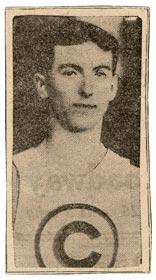 |
| Yank Robbins' mother, possibly in front of their home in Cambridge |
The 1908 Olympic 400 Meter Final - No Race!
One of the Most Controversial Races in Olympic History
The final of the 400 meters at the London Olympics in 1908 would be a battle of revolutionary proportions. Three Americans would race against Great Britain, represented by a lone Scot.
Lieutenant Wyndham Halswelle (#2) of Great Britain was the pre-race favorite. The Americans were John Taylor (#3) of the University of Pennsylvania, William "Yank" Robbins (#4) of Boston and John Carpenter(#1) of Cornell University. The British were so concerned that the Americans would use team tactics they stationed officials every 20 meters around the track.
The day before the much anticipated 400m final Amateur Athletic Union President James E. Sullivan met a group of American athletes on the street in London. He said, "Boys, if only we had some one who could give Halswelle a 300 yards the like of which he never saw in his life, one of our men might win. That's the only way the Englishman can be beaten."
With that an unoffensive looking little chap pushed his way from the rear of the group of athletes, and, looking the American athletic chief right in the eye, said, "Mr. Sullivan, we have a man who can do just what you say, and what is more, he is going to do it tomorrow." "Who is he?" asked Mr. Sullivan in surprise. The little fellow answered by tapping himself on the chest. It was Robbins, the little Boston sprinter.
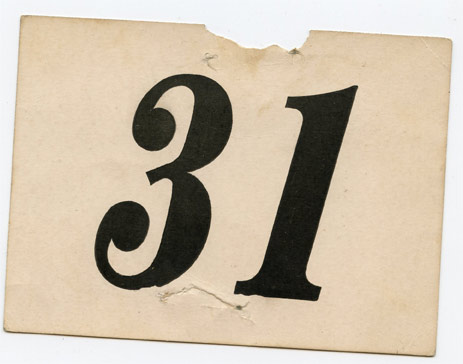 |
In Heat 7 in the first round, wearing #31, Robbins finished 1st running 50.4 seconds. | 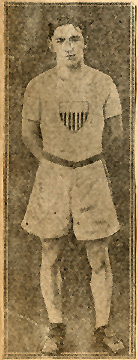 |
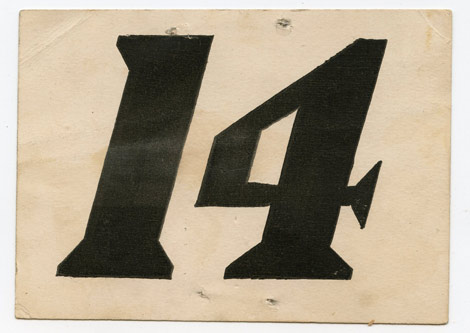 |
In semifinal 4 Robbins finished 1st running 49.0 wearing #14 | |
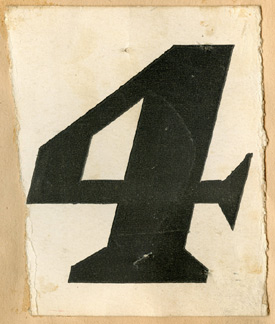 |
In the final Yank Robbins was given #4 . |
Robbins launched into the lead at the gun and built a 12 meter gap at the halfway point. Halswelle and Carpenter caught Robbins in the homestretch, Carpenter refused to let Halswelle pass, forcing him farther and farther to the outside lanes until he was within 18 inches of the curb. Officials immediately cried "foul" and "no race" and broke the finish line tape before the runners reached it.
Carpenter is seen here crossing the line while Halswelle has been forced wide to the left, nearly into the bleachers. Robbins is on the far right finishing second and Taylor trails the field.
Carpenter was disqualified and a re-run was ordered.
Robbins and Taylor were forbidden by American officials to run in the second race, leaving Halswelle to race alone to Olympic gold, to this day the one and only Olympic champion by walkover.
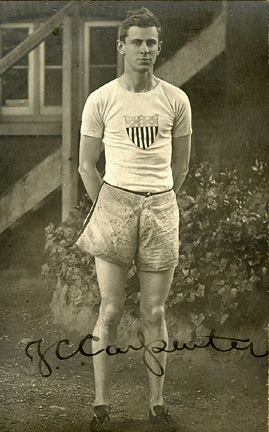 |
Robbins Describes his View of the Race
"Mike Murphy, the trainer said for me to run my own race and said the same to Carpenter and Taylor before we were called to the line and added, 'May one of you and the best man win.' As I had run all my races this year, I darted into the pole in the first 50 yards and carried my flight of speed all the way.
Rounding the turn I was leading with the others behind. When half way round the bend I noticed a man come from the outside of the track and yell to the others behind me that it was no race. I kept going however and entered the stretch in the lead with both Carpenter and Halswelle following close to me.
Carpenter passed me on the outside and of course carried the Britisher out with him. We three raced for a good distance on even terms until Carpenter finally passed me. Halswelle also headed me for a short way out but when I saw he was tiring I set out to get second or better and in the last 50 yards I passed him and finished second to Carpenter.
The latter never ran a fairer race, and it was a great surprise to me that I heard Carpenter had been disqualified. I never ran a better race in my life, and it was simply a race all the way. At least that is what I made it.
I ran the same knd of race in my preliminary heats, and going to the dressing room after the race John B. Taylor, the national and intercollegiate champion of the past two years told me that he was simply run off his feet and could not have given Carpenter, Halswelle or myself a battle. He said that Halswelle also acted the same, as the Britisher's running in the last part of the race was an evidence that he had been run into the earth.
After the event all of the Americans were the recipients of cat calls and all kind of unsportsmanlike talk. The officials were the poorest that I have had experience of running under, and that is saying a great deal, for many of the meets in which I have contested have been poorly handled."
After the race the American committee felt the British officials should be charged with unfair and unsportsmanlike conduct. One of the committee members, a Mr. Kirby, criticized the method of drawing the heats and the action of British officials in openly coaching the British contestants. He then gave a full account of the conversation that took place betwen the American committee and the referee of the games after the first running of the 400 meter final, bringing out the point that the referee admitted that Carpenter could not have fouled Lieut. Halswelle, but it was the other man, "The white one" namely Robbins.
American committee: |
We desire formally to protest against your declaring the 400-meter final as"no race." |
The referee: |
Your protest will be noted. |
American committee: |
In compliance with the rules we will submit our protest in writing. |
The referee: |
Have the same sent to the secretary. |
Mr. Kirby: |
Mr. Referee, we would like to know on just what grounds you have declared this final as "no race". |
The referee: |
It was because Lieut. Halswelle was fouled. |
Mr. Kirby: |
How, and by whom? |
The referee: |
By being elbowed by the American, Carpenter. |
Mr. Kirby: |
How could that be when Mr. Carpenter ws always leading Lieut. Halswelle? The only way for Halswelle to be elbowed by Carpenter was for Halswelle to run into Carpenter, to which case it would be Halswelle and not Carpenter who fouled. |
The referee: |
I was mistaken when I said Carpenter. I meant the other American. |
Mr. Kirby: |
Who, Robbins or Taylor? |
The referee: |
The white man. (Robbins. Taylor was African-American) |
Mr. Kirby: |
Then, Mr. Referee, to the end that there may be no misunderstanding, are we to believe that the final is declared "no race" because Mr. Robbins fouled Lieut. Halswelle by elbowing him? |
The referee: |
That is the case. |
Mr. Weeks |
Do you not think, Mr. Referee, it would be wise to call your judges together and take and consider testimony before disposing of the American protest? |
The referee: |
We will do so. |
Mr. Weeks |
And at once? |
The referee: |
At once. |
The result is now well known. Mr. Kirby lays "all blame and censure for bad feeling, unpleasant memories and disquieting fears" at the feet of the officials of the games, exonerating Lord Desborough and the British Olympic committee except for their bad judgement in appointing such officials.
Meeting President Theodore Roosevelt
When the American team returned from London, President Theodore Roosevelt hosted them at his Sagamore Hill home on Long Island.
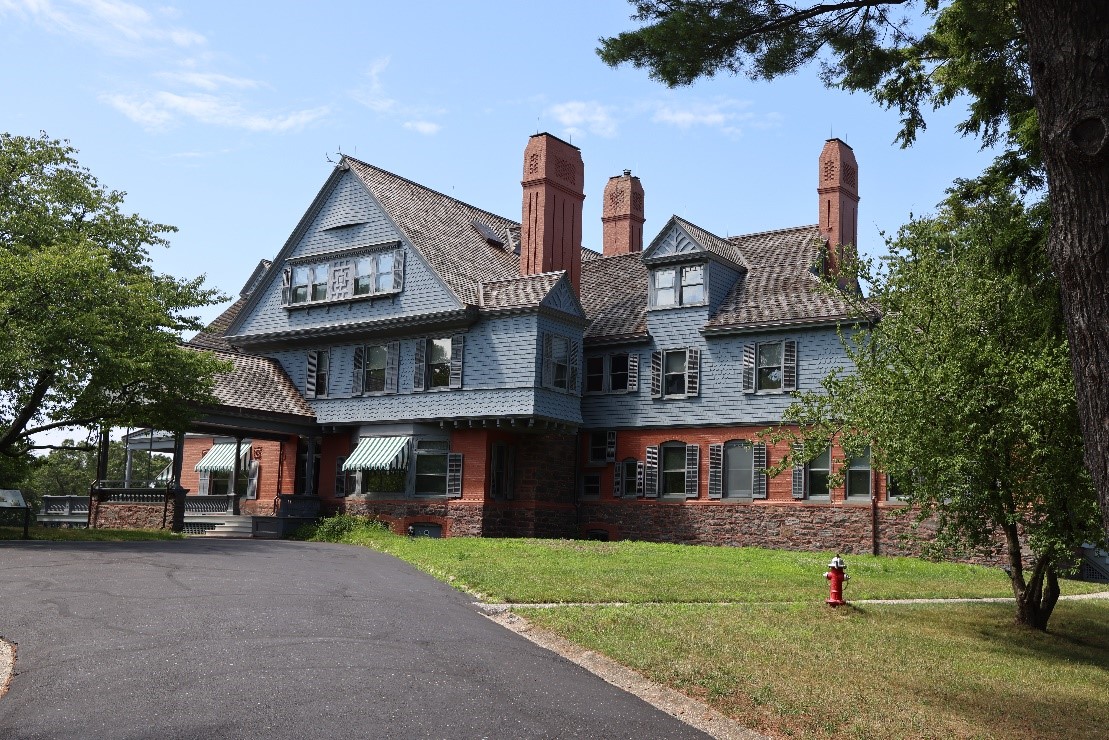
"You fellows have won a place for all time," said the President. "I feel like giving you the advice I gave to my regiment after it disbanded. Remember that you are heroes for 10 days, but when that time is up, drop the hero business and get to work... Some 10 or 15 years from now I should not like to meet some seedy individual who would say that he had won at the Olympic games and had done nothing since."
"I was especially interested in the Marathon race," went on the President, "You know they always said that while we were good in speed, we had no endurance. But we showed them, by George."
The athletes gathered on the lawn in front of the house and gave rousing cheers for the President and his family. Departing, they sang "For He's a Jolly Good Fellow," until they were out of sight and hearing.
They boarded the Presidential Yacht and headed back to New York City.
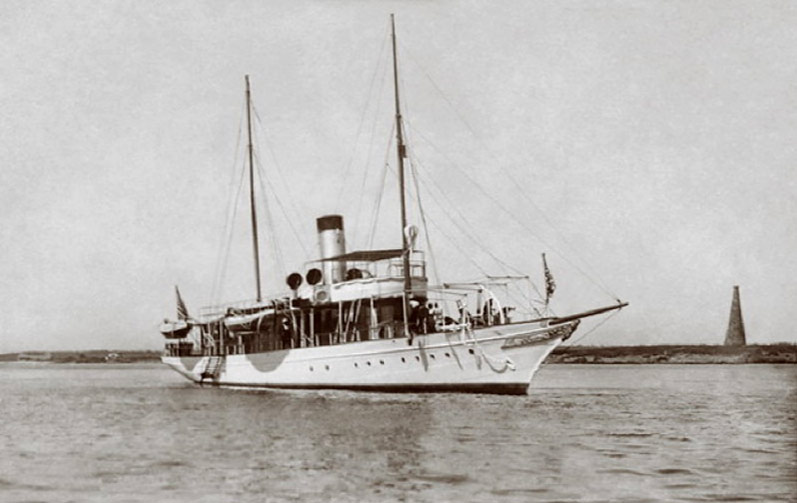
USS Slyph - Presidential Yacht 5
Joining the Club - Yank Runs for the I.A.A.C.
Following the Olympic Games Yank Robbins competed for the Irish American Athletic Club based in New York, also known as the Winged Fists.
In 1914 the club became so strong that members won every senior and junior championship in the United States and Canada with the exception of one event in Pittsburgh.
A few months after the Olympics Robbins was scheduled for a big match race in New York City against Mel Sheppard, gold medalist in the 800m, the 1,500m and the Medley Relay. Robbins couldn't compete due to a strained tendon and was replaced by Charlie Bacon who had won gold and set a world record in the 400m hurdles at the 1908 Olympics..
The decline of the Irish American Athletic Club began with the advent of the First World War in 1914. The club decided to give up athletics for the duration of the war, and afterwards the losses suffered combined with Prohibition limited the ability of the club to draw crowds to their events.
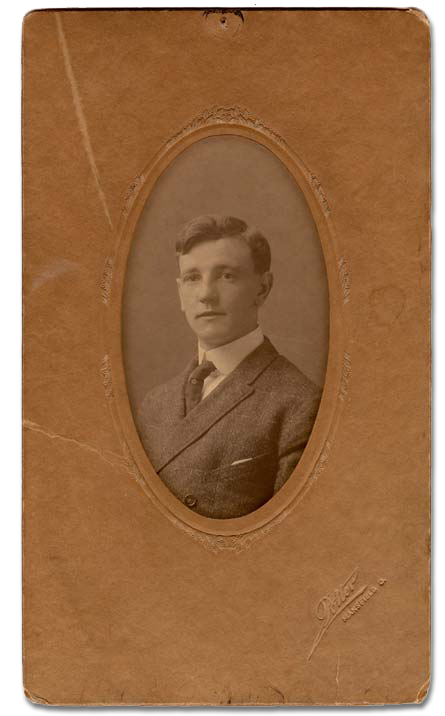
William Corbett "Yank" Robbins
---------------------
RP
News | Articles | Trivia
| Profiles | Vintage
Video | Vintage Photos | Contact
Us | Site Map | Home
Cards | Posters
| Autographs | Books
| Pins | Prints
| Authentics | Sportscasters
| How to Order
©
Running Past LLC All Rights Reserved mail@runningpast.com


